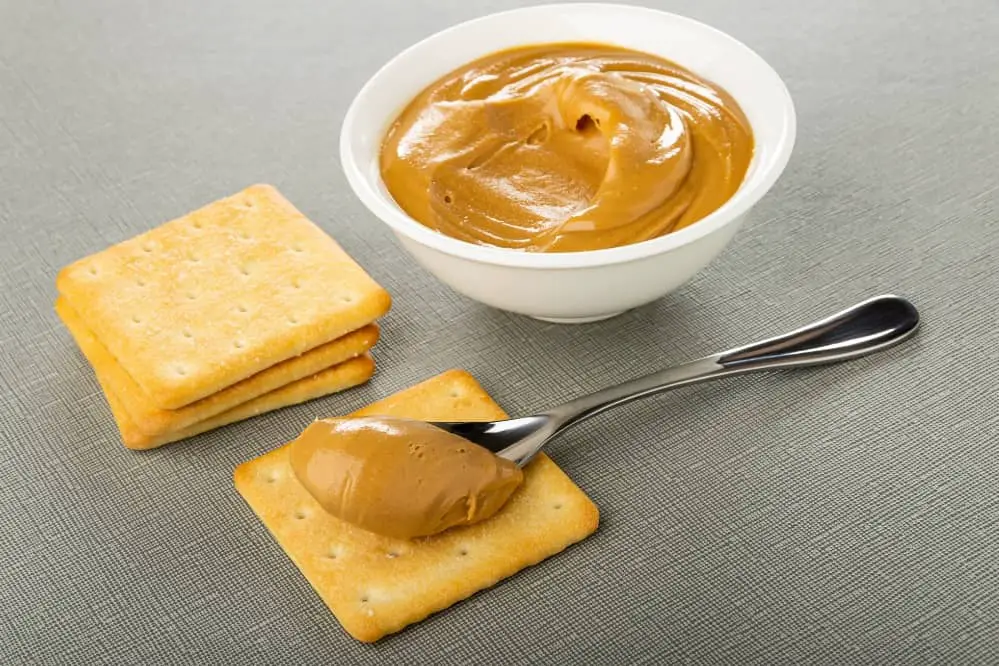Crackers are a versatile, tasty option for a quick snack. Many people enjoy different varieties of crackers from salty crackers to go with a cheese board to sweet graham crackers for smores. While enjoying your crackers, you may wonder if you can share their deliciousness with your dog. In this article, we’ll discuss whether or not dogs can eat crackers and whether or not they should.
Can Dogs Eat Crackers?
There are lots of human foods, like grapes or chocolate, that dogs cannot eat. If dogs ingest these foods, they can have digestive issues and experience severe illness or even death. So, it is important for a dog owner to always know if certain human foods are safe for dogs to eat before giving them to your dog. Crackers typically do not cause digestive issues in dogs. Dogs can digest crackers without issue because of their simple ingredients. Most crackers are made up of flour, yeast, and water – all of which are ingredients that are safe for dogs to eat (except for dogs with gluten intolerances). Therefore, dogs typically do not have any problems digesting crackers. However, some crackers may include other ingredients or seasonings that can trigger an adverse reaction in a dog. Crackers that contain additives, sweeteners, or other extra ingredients can be unhealthy for dogs. It is a good idea to avoid these types of crackers just in case. If you are going to feed your dog crackers, assume that they can only eat plain, unsalted crackers safely.
Should Dogs Eat Crackers?
Just because dogs can eat crackers doesn’t mean that they should. While dogs can digest crackers without illness, they have little nutritional value. In other words, though crackers aren’t harmful to dogs, they aren’t beneficial either. Crackers should never be substituted into a dog’s diet nor should they be fed to dogs regularly. Crackers tend to be high in calories but lack any substantial nutritional value. If a dog eats crackers too often, it may experience unhealthy weight gain.

Crackers with salt, cheese, peanut butter, or seasonings are also not recommended for dogs. Even though dogs can eat these crackers, there is no reason for them to. Crackers do not provide any health benefits for dogs and don’t contribute to their daily nutritional needs. Additionally, many crackers contain high levels of fats – especially peanut butter or cheese crackers – that may give your dog an upset stomach if eaten in amounts of more than one or two crackers. While they may seem like a tasty treat for your dog, they may result in an upset stomach or digestive issues. Even though your dog may be begging for the crackers in the moment, it’ll thank you later for saving it a stomachache.
So, while the occasional cracker is okay for your dog, you should not feed your dog crackers regularly. It will do your dog no harm to eat a cracker or two as an occasional treat or reward. However, as a general rule, you should stick to feeding your dog only foods that are meant for dogs.
Dog-Friendly Crackers
If you do decide to feed your dog crackers, make sure they only contain dog-friendly ingredients. Look for plain, unsalted crackers that do not contain added seasonings. Additionally, seek out crackers that are low in sugar. Make sure to always read the ingredient list thoroughly.
Some crackers may contain ingredients or artificial sweeteners that are harmful to dogs. Xylitol, for example, is an artificial sweetener that is extremely toxic to dogs. Consumption of this substance may lead to fatality. So, it is very important to check the ingredient list before feeding your dog store-bought crackers. Make sure you are familiar with all the ingredients. If you don’t recognize an ingredient, look it up and make sure that it is safe for dogs to consume.
It is important to give your dog unsalted crackers. Too much salt can lead your dog to be dehydrated or, in extreme cases, develop sodium ion poisoning. If you notice your dog exhibiting symptoms like vomiting, diarrhea, lethargy, excessive drooling, or any other out-of-the-ordinary behaviors after consuming crackers, go to your veterinarian immediately. Your dog may be having an adverse reaction to the crackers. However, most dogs should not react to plain, unsalted crackers.
Additionally, you could opt for crackers designed for dogs rather than feeding your dog human crackers. There are lots of dog-specific crackers similar to treats and made with ingredients that are good for your dog. This is a much better option for your dog in terms of nutritional value and health benefits. While it may be tempting to share your crackers with your dog, it is generally a better idea to avoid it. Crackers do not provide any health benefits for dogs, and, if anything, they can do more harm than good. If you’re looking to reward your dog with a tasty treat, try dog crackers or treats rather than human foods.
Final Thoughts
Generally speaking, you should only feed your dog products specifically designated for dogs. Though it can be tempting to share your food with your dog, it is not always a good idea. There are lots of foods that are tasty to humans but unhealthy for dogs. When it comes to crackers, dogs can typically process and digest them without issue. However, crackers do not provide any health benefits for dogs. In fact, they could be harmful depending on their levels of calories and sugars. If you do decide to feed your dog crackers, make sure you know what all the ingredients are. Seek out plain, unsalted crackers that will be easy on your dog’s digestive system. It is not a good idea to feed your dog crackers regularly or to supplement crackers into your dog’s diet. If your dog has an adverse reaction to crackers, visit your veterinarian immediately.

